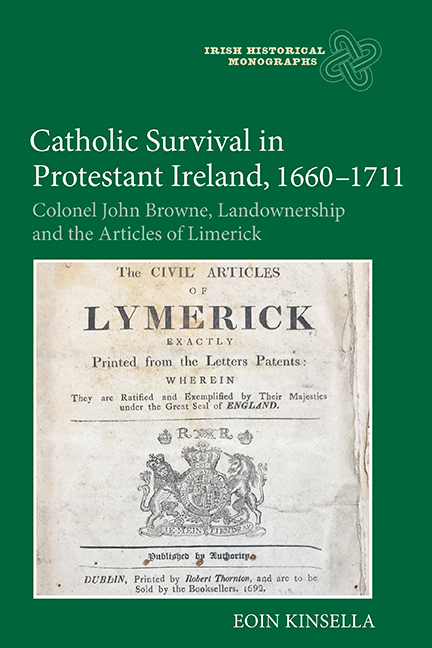 Catholic Survival in Protestant Ireland, 1660–1711
Catholic Survival in Protestant Ireland, 1660–1711 Book contents
- Frontmatter
- Dedication
- Contents
- List of Illustrations
- Acknowledgements
- List of Abbreviations
- Editorial Note
- Glossary
- Introduction
- Part I The Rise and Fall of the ‘New Interest’
- Part II The Articles of Surrender
- Part III Article 13 of Limerick
- 6 ‘This clause was surreptitiously obtained’: Implementing article 13 of Limerick, 1691–8
- 7 ‘I fear a bill relating to me be gone for England’: Implementing article 13 of Limerick, 1698–1708
- 8 ‘I am plagued with a quarrel’: The Browne family and the gentry of Connacht, 1692–1711
- Conclusion
- Appendix A Articles of Surrender, 1690–91
- Appendix B Hearings scheduled for adjudication under the articles of Limerick, 1694
- Appendix C Proclamations of 7 July & 1 August 1691; ‘A copy of and answers to several complaints made by the Irish by their agent Mr Cockly’
- Bibliography
- Index
8 - ‘I am plagued with a quarrel’: The Browne family and the gentry of Connacht, 1692–1711
from Part III - Article 13 of Limerick
Published online by Cambridge University Press: 28 June 2018
- Frontmatter
- Dedication
- Contents
- List of Illustrations
- Acknowledgements
- List of Abbreviations
- Editorial Note
- Glossary
- Introduction
- Part I The Rise and Fall of the ‘New Interest’
- Part II The Articles of Surrender
- Part III Article 13 of Limerick
- 6 ‘This clause was surreptitiously obtained’: Implementing article 13 of Limerick, 1691–8
- 7 ‘I fear a bill relating to me be gone for England’: Implementing article 13 of Limerick, 1698–1708
- 8 ‘I am plagued with a quarrel’: The Browne family and the gentry of Connacht, 1692–1711
- Conclusion
- Appendix A Articles of Surrender, 1690–91
- Appendix B Hearings scheduled for adjudication under the articles of Limerick, 1694
- Appendix C Proclamations of 7 July & 1 August 1691; ‘A copy of and answers to several complaints made by the Irish by their agent Mr Cockly’
- Bibliography
- Index
Summary
It is difficult to gauge the overall effect of article 13 of Limerick, and the prolonged sale of the estate, on John Browne's family and on the wider Connacht community. From 1698 Browne's eldest son Peter became increasingly involved in the management of the family's debts. Browne's four other children (Valentine, Bridget, Elizabeth and Mary) were largely peripheral figures in this business, though the marriages of two of his three daughters and their consequent dowries placed him under further financial burdens and brought Browne into conflict with their husbands. As Browne's most important legal representative in the 1690s and 1700s, Edmund Malone played a prominent role in the management of his affairs, including disputes with Lord Athenry and Viscount Mayo, Browne's sons-in-law. In Dublin, Luke Hussey's diligence was important to the management of Browne's business. This chapter examines the impact of John Browne's debts on the lives of his children, as well as the agency of his nephew Edmund Malone on behalf of several Catholic and Protestant families in Counties Galway and Mayo. The first section analyses Malone's work in London as he managed the affairs of the Brownes of the Neale, the Blakes of Moyne, County Galway, and the Veseys of County Galway, as well as Malone's occasionally tense relationship with his uncle. The lives of Browne's children are discussed in section II, through the prism of their relationship with their father. Though Peter Browne's correspondence is relatively well preserved among the Westport papers, the same cannot be said of Valentine Browne and his three sisters. Section III examines the conversion to Protestantism of two of John Browne's grandsons: Francis Bermingham, future Baron Athenry, and Peter Browne's son, John Browne, future earl of Altamont. Francis Bermingham's conversion in particular allows an insight into the pressure brought to bear on the Catholic gentry of Ireland by the penal laws.
The main branch of the Browne family remained at the Neale after the death of Colonel John Browne's father in 1670, with the estate inherited by George Browne, the eldest son. Like his father and several of his direct descendants, George Browne never assumed the baronetcy bestowed on the family in 1636 – that title was not assumed until 1762, by George Browne's great–grandson (also named George) whose brother John was in turn elevated to the peerage as Baron Kilmaine (second creation) in 1789.
- Type
- Chapter
- Information
- Catholic Survival in Protestant Ireland, 1660–1711Colonel John Browne, Landownership and the Articles of Limerick, pp. 210 - 235Publisher: Boydell & BrewerPrint publication year: 2018


